By Seth Sandronsky
Rev. Mahsea Evans opened Sacramento’s third annual Solidarity Summit on Homelessness with a welcoming speech and a secular prayer on Sept. 7 at the First United Methodist Church in Midtown. The summit highlighted the ties between affordable health care and rental housing, harm reduction versus punishment and the needs of the Black unhoused community.
Niki Jones, executive director of the Sacramento Regional Coalition to End Homelessness, led the land acknowledgments honoring the Miwok peoples who are indigenous to the capital region. Sacramento mayoral candidate Dr. Flojaune Cofer followed and shared in part her mom’s words of wisdom. “Solutions are everybody’s problems because we need each other,” she said.
Cofer’s message of solidarity as a solution to improve the lives of Sacramento’s unhoused population was a main theme of the daylong summit, which featured four plenary workshops, food, music and many opportunities for advocacy and outreach.
Summit co-organizer Faye Wilson Kennedy presented the history behind the capital city’s disproportionate Black unhoused population, referencing housing discrimination and labor exploitation as driving forces.
Between 1940 and 1970, lenders and real estate agents confined Black residents to Del Paso Heights, Oak Park and the razed West End neighborhoods in a process called redlining. In 1970, Black workers began to move into South Sacramento and areas such as Natomas, according to Kennedy’s presentation during the event.
In the 1980s, Reaganomics, or trickle-down economics, produced policies and politics that redistributed income and wealth from the bottom and middle to the top, disproportionately affecting Black Americans and people of color.
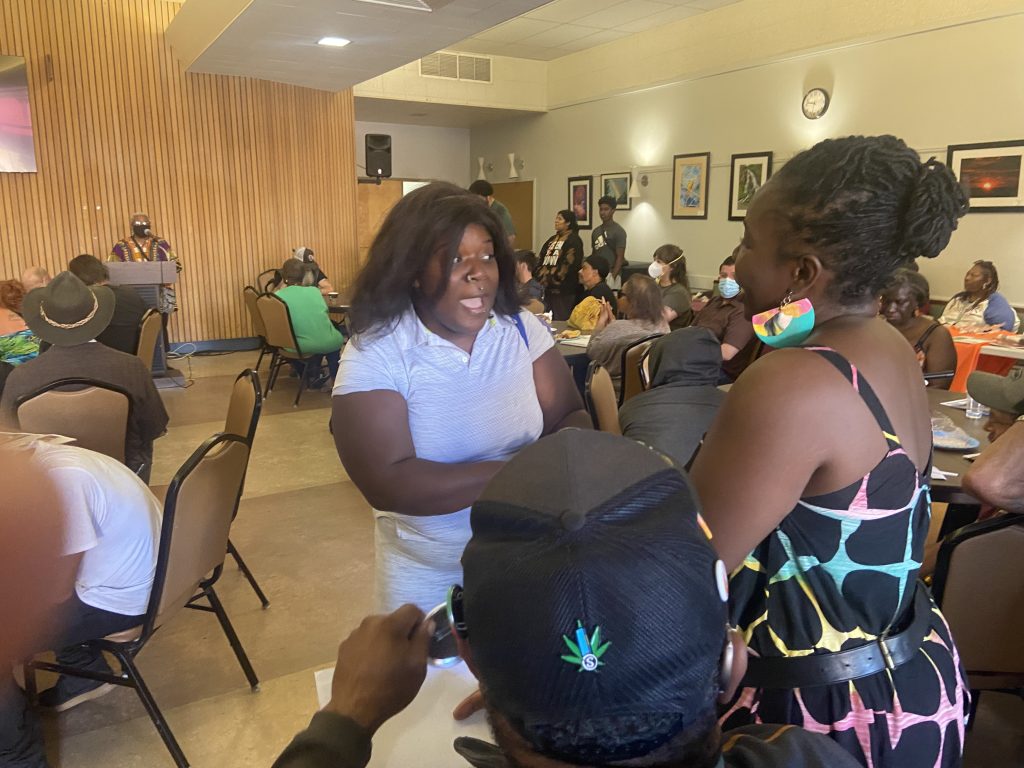
Kennedy’s proposed solution to reducing homelessness for Black people centered on changing government policies. Two examples Kennedy provided are ending the unhoused to criminal-justice pipeline, and increasing access to affordable rental housing options.
A four-person panel discussed harm reduction for unhoused communities, its links to homeless organizing and the damage done by the 1970s war on drugs. Panelist and musician Kenny B of Harm Reduction Services pointed out that human rights and social justice are the governing principles of harm reduction.
According to panelist Sarah Whipple, drug users are not all addicts, despite stereotypes to the contrary. “Unhoused people who do use drugs should not lack access to homeless shelters,” said Whipple, a community advocate with Harm Reduction Services for drug treatment policies that promote health and wellness versus punitive measures that harm those who use drugs.
Leslie Napper, a senior legal advocate with Disability Rights California, gave the summit’s keynote speech on the power of collective impact in supporting unhoused communities and people with disabilities. “Local and state policies are targeting and criminalizing the unhoused, disproportionately African Americans with disabilities,” she said.
Napper noted that Black Sacramentans had a 96% rate of health insurance coverage compared to white counterparts in federal census data for 2021. However, continuing health disparities for Black Americans persist in ways that suggest access to insurance alone does not guarantee wellness, especially mental health, according to Napper.
A post-lunch panel featured unhoused people speaking about their reality. Speakers included Rhonda Wise and her boyfriend Matthew Windsor. The pair know a thing or two about local homeless policies and progressive alternatives, having previously lived in a homeless encampment on Stockton Boulevard for two years.
“Faye Kennedy helped Rhonda and me to secure a studio apartment,” Wise said. “She and Brother [Kevin] Carter (a leading figure of the Sacramento Poor People’s Campaign) also helped us to get food and other resources.”
JayCatt, Maddison Cephas and Juanita “Nina” Butterfly also discussed first-hand views of homelessness at the summit. Butterfly gained attention painting the names of people who died of homelessness on boulders at a former encampment for the unhoused in Sonoma County.
In another afternoon panel, activists with the Los Angeles Community Action Network (LACAN) voiced their experiences and insights resisting the criminalization of the unhoused. “We are at the epicenter of the homeless crisis over the past 25 years,” said General Dogon, a human rights worker with LACAN. One aspect of decriminalizing homelessness has been resistance to increasing personal property rights of the unhoused living in tents, according to Dogon.
Aaliyah Muhammad, a member of All of Us or None and a formerly incarcerated person with children, also tabled at the summit. Her focus was on assisting former inmates who are unhoused after release. “We have to change the policies that reject homeless reentry people from shelters,” Muhammad said.
Kennedy and Zuri K. Colbert presented a Black hygiene call-to-action, highlighting the need for more resources for textured hair and darker skin tones. The need for these resources is great, as Black Sacramentans make up 9% of the general population but 33% of the city’s unhoused population, according to the 2024 Point in Time count.
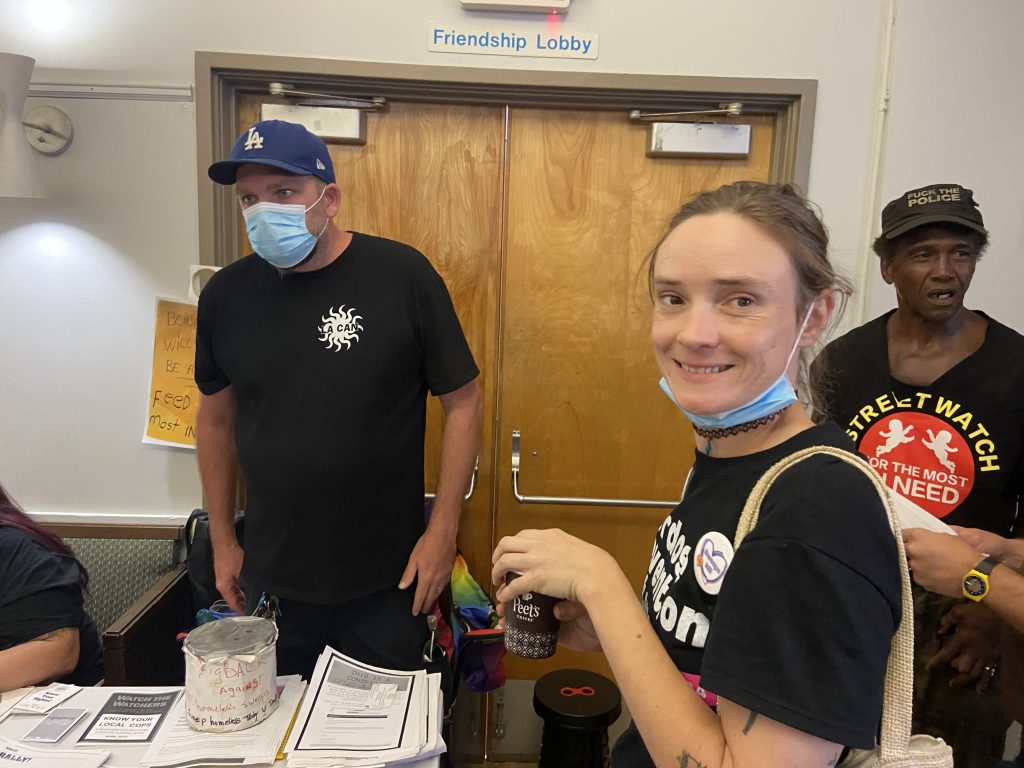
The summit included many advocacy groups that tabled throughout the day. Ontrack Program Resources works to end homelessness in Sacramento through policy, advocacy and education, with a focus on Black reentry inmates to access necessary resources, according to Paul Y. Moore, partnership development manager.
The Sacramento Homeless Organizing Committee was the main coordinator of the summit, partnering with other other community resource organizations that helped organize and provide information and resources to unhoused attendees including: Community Lead Advocacy Program, Sacramento Area Black Caucus, CA Black Health Care Network, Sacramento Poor People’s Campaign, Sacramento Loaves & Fishes and others.
The summit also released a statement opposing the genocide against civilians in Palestine, and support for the exploited people facing violence, from Sudan to the Congo and Haiti, along with migrants and undocumented people stateside.
The summit organizers provided adult-supervised play care for 11 children, ages 6 months to 10 years. In this way, the kids’ parents were able to participate in the summit, which drew 150 people, according to Kennedy.
This story is part of the Solving Sacramento journalism collaborative. Solving Sacramento is supported by funding from the James Irvine Foundation and the James B. McClatchy Foundation. Our partners include California Groundbreakers, Capital Public Radio, Outword, Russian America Media, Sacramento Business Journal, Sacramento News & Review, Sacramento Observer and Univision 19. Sign up for our monthly newsletter.

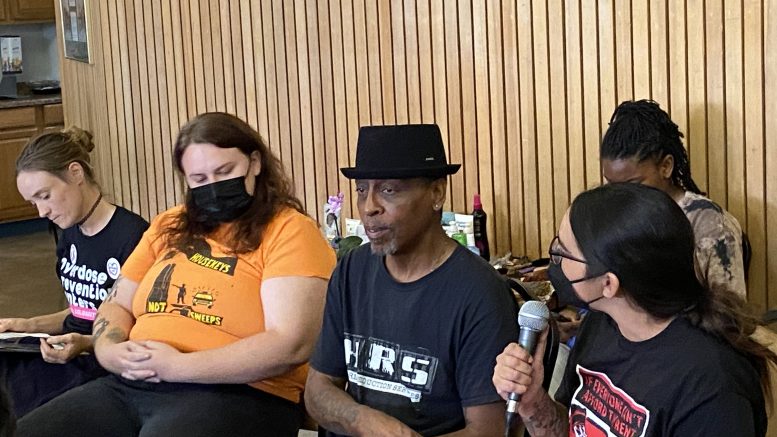

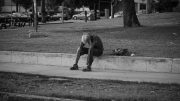
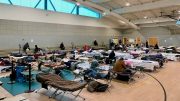

Be the first to comment on "Sacramento’s annual Solidarity Summit on Homelessness highlights needs, resources for the unhoused"